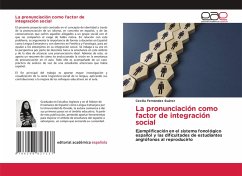
Pronunciation as a factor of social integration
Exemplification in the Spanish phonological system and the difficulties of English-speaking students in reproducing it.
Versandkostenfrei!
Versandfertig in 6-10 Tagen
29,99 €
inkl. MwSt.

PAYBACK Punkte
15 °P sammeln!
This project focuses on the concept of identity through the pronunciation of a language, specifically Spanish, and the consequences suffered by those close to a social group with which they do not share the native speech trait. In relation to this problem, the importance of training teachers in Spanish as a Foreign Language and in Phonetics and Phonology is argued, in order to help foreigners in their social integration. It also explores the perspective of teachers towards teaching in this area and the idea of achieving an ideal pronunciation. In addition, a summary of how the vision of teachi...
This project focuses on the concept of identity through the pronunciation of a language, specifically Spanish, and the consequences suffered by those close to a social group with which they do not share the native speech trait. In relation to this problem, the importance of training teachers in Spanish as a Foreign Language and in Phonetics and Phonology is argued, in order to help foreigners in their social integration. It also explores the perspective of teachers towards teaching in this area and the idea of achieving an ideal pronunciation. In addition, a summary of how the vision of teaching pronunciation in the classroom has evolved is provided. All this is accompanied by a case study of voice analysis of an American student who speaks Spanish. The main purpose of the paper is to provide further research and visualization of the linguistic-social branch of language, applying its contributions to the improvement of educational approaches in the classroom.












